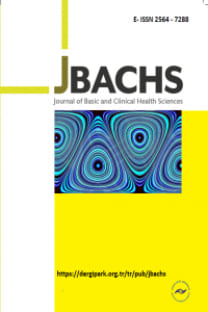A Rare Cause of Anuria: A Case of Inflammatory Iliac Aneurysm
A Rare Cause of Anuria: A Case of Inflammatory Iliac Aneurysm
___
- 1. Forsdahl SH, Singh K, Solberg S, Jacobsen BK. Risk factors for abdominal aortic aneuryms: a 7 years prospective study: the Tromso Study. Circulation 2009;119:2202–2208. [CrossRef]
- 2. Kashyap VS, Fang R, Fitzpatrick CM, Hagino RT. Caval and ureteral obstruction secondary to an inflammatory abdominal aortic aneurysm. J Vasc Surg 2003;38:1416–21. [CrossRef]
- 3. Morishita A, Tomioka H, Katahira S, Hoshino T, Hanzawa K. Open Surgery for Giant Bilateral Internal Iliac Artery Aneurysms with Compression of Neighboring Abdominal Structures: A Case Report. Ann Vasc Dis 2015;8:265–267. [CrossRef]
- 4. Galosi AB, Grilli Cicilioni C, Sbrollini G, Angelini A, Maselli G, Carbonari L. Inflammatory abdominal aortic aneurysm presenting as bilateral hydroureteronephrosis: A case report and review of literature. Arch Ital Urol Androl 2014;86:385–386. [CrossRef]
- 5. Mujtaba B, Jan MF. Answer to case of the month #157: anuria in the supine position. Can Assoc Radiol J 2009;60:281–282. [CrossRef]
- 6. Meecham L, Koo V, Rajjayabun P. Uretero-iliac artery aneurysm fistula: A rare but fatal cause of haematuria. J Surg Case Rep 2012:16. [CrossRef]
- 7. Tang T, Boyle JR, Dixon AK, Varty K. Inflammatory Abdominal Aortic Aneurysms. Eur J Vasc Endovasc Surg 2005;29:353–362. [CrossRef]
- 8. Pennell RC, Hollier LH, Lie JT, et al. Inflammatory abdominal aortic aneurysms: a thirty-year review. J Vasc Surg 1985;2:859–869. [CrossRef]
- 9. Bonnet P, Vandenberg C, Limet R. Treatment of urological complications related to aortoiliac pathology and surgery. Eur J Vasc Endovasc Surg 2003;26:657–664. [CrossRef]
- 10. Nevelsteen A, Lacroix H, Stockx L, Baert L, Depuydt P. Inflammatory abdominal aortic aneurysm and bilateral complete ureteral obstruction: treatment by endovascular graft and bilateral ureteric stenting. Ann Vasc Surg 1999;13:222–224. [CrossRef]
- 11. Jetty P, Barber GG. Aortitis and bilateral ureteral obstruction after endovascular repair of abdominal aortic aneurysm. J Vasc Surg 2004;39:1344–1347. [CrossRef]
- Yayın Aralığı: 3
- Başlangıç: 2016
- Yayıncı: DOKUZ EYLÜL ÜNİVERSİTESİ
Sevecen Seyhun NASİR, Aysegül YURT, Nuri KARABAY, Cenk UMAY, Barbaros AYDİN, Ayse Nur DEMİRAL
The Relationship Between Psychological Resilience and Social Support Levels in Hemodialysis Patients
Ezgi KARADAĞ, Merve ERÜNAL, Hatice MERT, Özlem UĞUR
Ezgi KARADAG, Ozlem UGUR, Hatice MERT, Merve ERUNAL
Bulent BAKAR, Cansel CETİN, Jonathan OPPONG, Ahmet Melih ERDOGAN
Gölgem MEHMETOĞLU, Gülbin ERGİN, Serkan BAKIRHAN
The Aspects of Psychosocial Risks Prevention in a Developing Country: Turkey
Muhammet GUZELSOY, Baran TAN, Ali Riza TURKOGLU, Soner COBAN, Ufuk AYDIN
Ayşe Nur DEMİRAL, Ayşegül YURT, Nuri KARABAY, Barbaros AYDIN, Sevecen Seyhun NASİR, Cenk UMAY
A Rare Cause of Anuria: A Case of Inflammatory Iliac Aneurysm
Ufuk AYDIN, Baran TAN, Ali Rıza TÜRKOĞLU, Soner ÇOBAN, Muhammet GÜZELSOY
